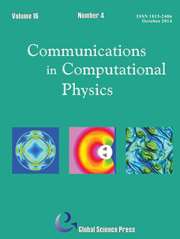Crossref Citations
This article has been cited by the following publications. This list is generated based on data provided by
Crossref.
ten Eikelder, M.F.P.
Daude, F.
Koren, B.
and
Tijsseling, A.S.
2017.
An acoustic-convective splitting-based approach for the Kapila two-phase flow model.
Journal of Computational Physics,
Vol. 331,
Issue. ,
p.
188.
Chalons, Christophe
and
Stauffert, Maxime
2017.
Finite Volumes for Complex Applications VIII - Hyperbolic, Elliptic and Parabolic Problems.
Vol. 200,
Issue. ,
p.
63.
Peluchon, S.
Gallice, G.
and
Mieussens, L.
2017.
A robust implicit–explicit acoustic-transport splitting scheme for two-phase flows.
Journal of Computational Physics,
Vol. 339,
Issue. ,
p.
328.
Barsukow, Wasilij
Edelmann, Philipp V. F.
Klingenberg, Christian
Miczek, Fabian
and
Röpke, Friedrich K.
2017.
A Numerical Scheme for the Compressible Low-Mach Number Regime of Ideal Fluid Dynamics.
Journal of Scientific Computing,
Vol. 72,
Issue. 2,
p.
623.
Iampietro, David
Daude, Frédéric
Galon, Pascal
and
Hérard, Jean-Marc
2017.
Finite Volumes for Complex Applications VIII - Hyperbolic, Elliptic and Parabolic Problems.
Vol. 200,
Issue. ,
p.
3.
Chalons, Christophe
Girardin, Mathieu
and
Kokh, Samuel
2017.
An all-regime Lagrange-Projection like scheme for 2D homogeneous models for two-phase flows on unstructured meshes.
Journal of Computational Physics,
Vol. 335,
Issue. ,
p.
885.
Chalons, C.
and
Guisset, S.
2018.
An Antidiffusive HLL Scheme for the Electronic $M_1$ Model in the Diffusion Limit.
Multiscale Modeling & Simulation,
Vol. 16,
Issue. 2,
p.
991.
Castro Díaz, Manuel J.
Chalons, Christophe
and
de Luna, Tomás Morales
2018.
A Fully Well-Balanced Lagrange--Projection-Type Scheme for the Shallow-Water Equations.
SIAM Journal on Numerical Analysis,
Vol. 56,
Issue. 5,
p.
3071.
Dimarco, Giacomo
Loubère, Raphaël
Michel-Dansac, Victor
and
Vignal, Marie-Hélène
2018.
Second-order implicit-explicit total variation diminishing schemes for the Euler system in the low Mach regime.
Journal of Computational Physics,
Vol. 372,
Issue. ,
p.
178.
Iampietro, D.
Daude, F.
Galon, P.
and
Hérard, J.-M.
2018.
A Mach-sensitive splitting approach for Euler-like systems.
ESAIM: Mathematical Modelling and Numerical Analysis,
Vol. 52,
Issue. 1,
p.
207.
Iampietro, D.
Daude, F.
Galon, P.
and
Hérard, J.-M.
2018.
A Mach-sensitive implicit–explicit scheme adapted to compressible multi-scale flows.
Journal of Computational and Applied Mathematics,
Vol. 340,
Issue. ,
p.
122.
Tremblin, P.
Padioleau, T.
Phillips, M. W.
Chabrier, G.
Baraffe, I.
Fromang, S.
Audit, E.
Bloch, H.
Burgasser, A. J.
Drummond, B.
González, M.
Kestener, P.
Kokh, S.
Lagage, P.-O.
and
Stauffert, M.
2019.
Thermo-compositional Diabatic Convection in the Atmospheres of Brown Dwarfs and in Earth’s Atmosphere and Oceans.
The Astrophysical Journal,
Vol. 876,
Issue. 2,
p.
144.
Labourasse, E.
2019.
A low-Mach correction for multi-dimensional finite volume shock capturing schemes with application in lagrangian frame.
Computers & Fluids,
Vol. 179,
Issue. ,
p.
372.
Bruel, Pascal
Delmas, Simon
Jung, Jonathan
and
Perrier, Vincent
2019.
A low Mach correction able to deal with low Mach acoustics.
Journal of Computational Physics,
Vol. 378,
Issue. ,
p.
723.
Dellacherie, Stéphane
Faccanoni, Gloria
Grec, Bérénice
and
Penel, Yohan
2019.
Accurate steam-water equation of state for two-phase flow LMNC model with phase transition.
Applied Mathematical Modelling,
Vol. 65,
Issue. ,
p.
207.
Fan, Duoming
Nonaka, Andrew
Almgren, Ann S.
Harpole, Alice
and
Zingale, Michael
2019.
MAESTROeX: A Massively Parallel Low Mach Number Astrophysical Solver.
The Astrophysical Journal,
Vol. 887,
Issue. 2,
p.
212.
Abbate, Emanuela
Iollo, Angelo
and
Puppo, Gabriella
2019.
An Asymptotic-Preserving All-Speed Scheme for Fluid Dynamics and Nonlinear Elasticity.
SIAM Journal on Scientific Computing,
Vol. 41,
Issue. 5,
p.
A2850.
Padioleau, Thomas
Tremblin, Pascal
Audit, Edouard
Kestener, Pierre
and
Kokh, Samuel
2019.
A High-performance and Portable All-Mach Regime Flow Solver Code with Well-balanced Gravity. Application to Compressible Convection.
The Astrophysical Journal,
Vol. 875,
Issue. 2,
p.
128.
Vazquez-Gonzalez, Thibaud
Llor, Antoine
and
Fochesato, Christophe
2020.
A mimetic numerical scheme for multi-fluid flows with thermodynamic and geometric compatibility on an arbitrarily moving grid.
International Journal of Multiphase Flow,
Vol. 132,
Issue. ,
p.
103324.
Zou, Ziqiang
Audit, Edouard
Grenier, Nicolas
and
Tenaud, Christian
2020.
An Accurate Sharp Interface Method for Two-Phase Compressible Flows at Low-Mach Regime.
Flow, Turbulence and Combustion,
Vol. 105,
Issue. 4,
p.
1413.


